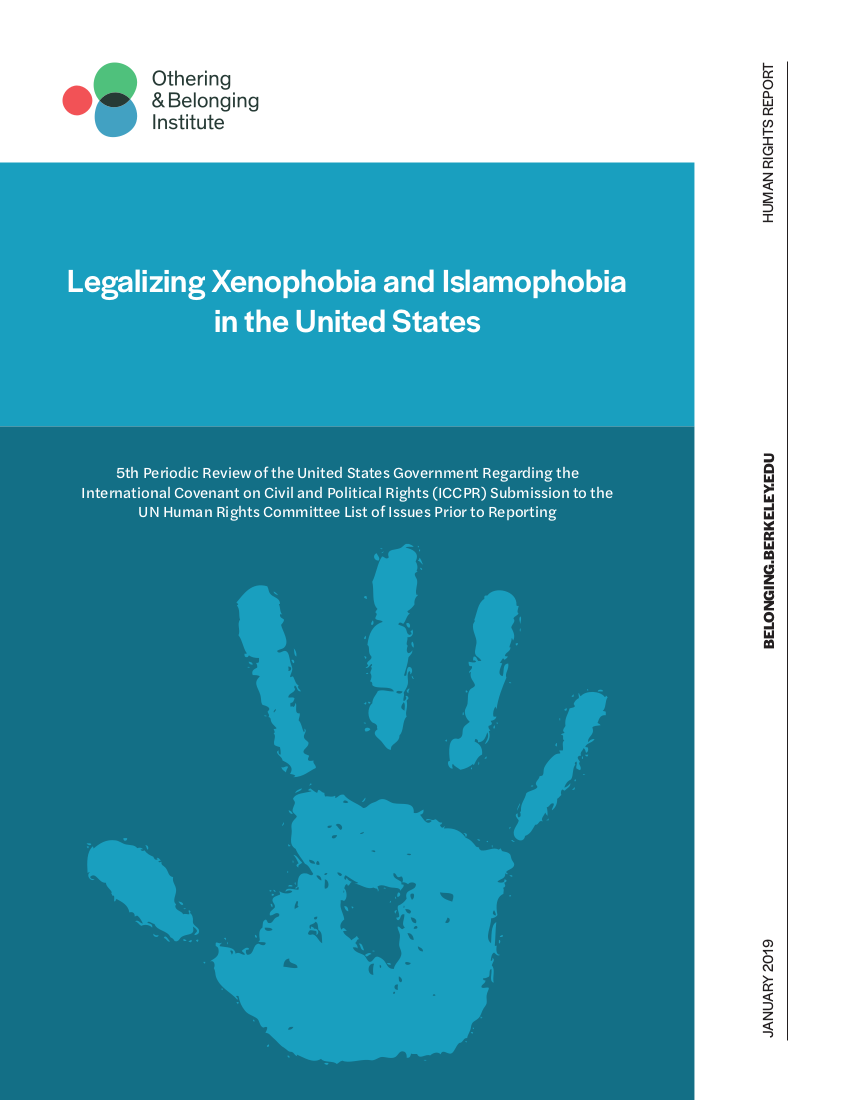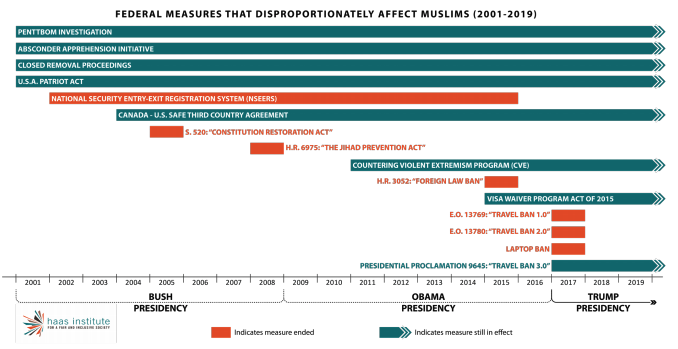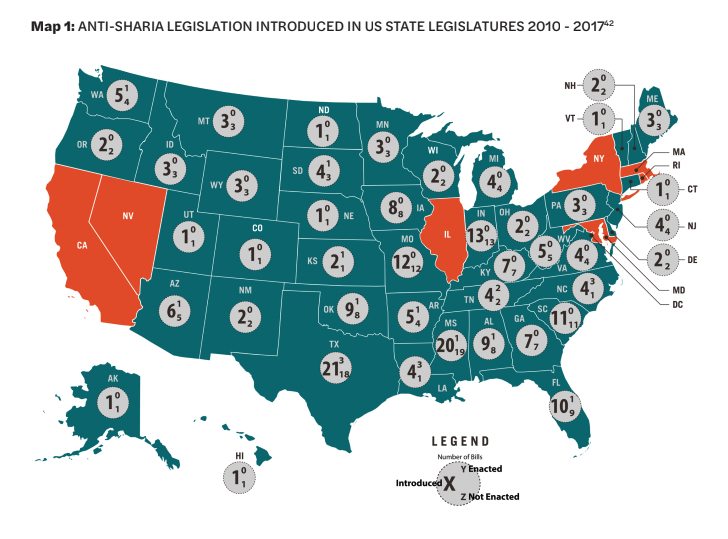Click to download a PDF of this report.
The report was submitted January 15, 2019 to the UN Human Rights Committee List of Issues Prior to Reporting on the 5th Periodic Review of the United States Government regarding the International Covenant on Civil and Political Rights (ICCPR).
This publication is part of the Global Justice Program’s Human Rights Agenda report series. In this series, we collaborate with other human rights, civil rights, and civil society organizations under the umbrella of the US Human Rights Network (USHRN), to advance the utility of the rights-based framework as a meaningful organizing tool for impacted communities and social movements to articulate claims of social, cultural, political rights, and belonging. Our reports are reviewed by the United Nations Human Rights Commission and inform the UN’s recommendations to hold the US Government and legislative body accountable to their obligations as related to the Universal Periodic Review (UPR), the International Convention on the Elimination of all forms of Racial Discrimination (ICERD), and the International Covenant on Civil and Political Rights (ICCPR).
I. Issue Summary
For nearly two decades the United States Federal Government (US Government), state governments, and local authorities, have infringed on the religious freedoms of its citizens and lawful residents by enacting policies and practices that disproportionately discriminate against Muslims. For example, the 2017 Presidential Proclamation 9645, known as the Travel Ban or otherwise referred to by the American Civil Liberties Union (ACLU) and others as the Muslim Ban,
Furthermore, the current political situation in the United States reflects a new reality influenced by a populist leadership that colludes with a reemergence of white supremacy.
Since 2001, the development of organized anti-Muslim efforts, and the rise of contemporary Islamophobia in the US, has intensified federal measures and state legislation
Additionally, these policies and legislation at the federal and state levels further subject Muslims to unwarranted surveillance, profiling, exclusion, and discrimination along the lines of racial and ethnic backgrounds, as determined by their national origin and religion.
II. ICCPR Legal Framework
While the ICCPR calls for the adaptation of special measures by signatory states to ensure the right of all peoples to pursue their economic, social, and cultural development, the US Government attempts to rationalize policies that reproduce racialized outcomes, citing existing inequalities as having manifested from conditions beyond the government’s control. For example, the US Government by its actions, or inactions, has contradicted its own obligations under the ICCPR, particularly in regards to the following articles:
ICCPR Article 2(1): Each State Party to the present Covenant undertakes to respect and to ensure to all individuals within its territory and subject to its jurisdiction the rights recognized in the present Covenant, without distinction of any kind, such as race, color, sex, language, religion, political or other opinion, national or social origin, property, birth or other status.
ICCPR Article 18(1): Everyone shall have the right to freedom of thought, conscience and religion. This right shall include freedom to have or to adopt a religion or belief of his choice, and freedom, either individually or in community with others and in public or private, to manifest his religion or belief in worship, observance, practice and teaching.
ICCPR Article 23(1): The family is the natural and fundamental group unit of society and is entitled to protection by society and the State.
ICCPR Article 26: All persons are equal before the law and are entitled without any discrimination to the equal protection of the law. In this respect, the law shall prohibit any discrimination and guarantee to all persons equal and effective protection against discrimination on any ground such as race, color, sex, language, religion, political or other opinion, national or social origin, property, birth or other status.
ICCPR Article 27: In those States in which ethnic, religious or linguistic minorities exist, persons belonging to such minorities shall not be denied the right, in community with the other members of their group, to enjoy their own culture, to profess and practice their own religion, or to use their own language.
III. Previous Concluding Observations, General Comments, and Recommendations by UN Human Rights Bodies on the US Government’s Policies and Practice
A. The UN Human Rights Committee’s Concluding Observations
The Human Rights Committee in their concluding observations on the fourth periodic report of the United States recommended that the state party should “Engage with stakeholders at all levels to identify ways to give greater effect to the Covenant at federal, state and local levels, taking into account that the obligations under the Covenant are binding on the State party as a whole, and that all branches of government and other public or governmental authorities at every level are in a position to engage the responsibility of the State party” (general comment. No. 31, para. 4).
In 2006, the Human Rights Committee considered the second and third periodic reports of the United States, and provided the following recommendation in regards to the definition of terrorism under domestic law: “The State party should ensure that its counter-terrorism measures are in full conformity with the Covenant and in particular that the legislation adopted in this context is limited to crimes that would justify being assimilated to terrorism, and the grave consequences associated with it.” See the 2006 Concluding Observations of the Human Rights Committee.
B. The UN Human Rights Committee’s General Comments
General Comment No. 19: Article 23 (The family)
“1. Article 23 of the International Covenant on Civil and Political Rights recognizes that the family is the natural and fundamental group unit of society and is entitled to protection by society and the State...Article 17 establishes a prohibition on arbitrary or unlawful interference with the family... Similarly, the possibility to live together implies the adoption of appropriate measures, both at the internal level and as the case may be, in cooperation with other States, to ensure the unity or reunification of families, particularly when their members are separated for political, economic or similar reasons.”
Yet, the US Government by way of the Presidential Proclamation (Travel Ban), violates theright of family reunification as is enshrined in the US Constitution and US immigration law, and disproportionately discriminates against, and bans the nationals from five Muslim-majority countries from entering the United States. By not adhering to General Comment No. 19 of the UN Human Rights Committee, the United States is noncompliant with the ICCPR.
General Comment No. 18: (Non-discrimination)
“Non-discrimination, together with equality before the law and equal protection of the law without any discrimination, constitute a basic and general principle relating to the protection of human rights. Thus, article 2, paragraph 1, of the International Covenant on Civil and Political Rights obligates each State party to respect and ensure to all persons within its territory and subject to its jurisdiction the rights recognized in the Covenant without distinction of any kind, such as race, colour, sex, language, religion, political or other opinion, national or social origin, property, birth or other status. Article 26 not only entitles all persons to equality before the law as well as equal protection of the law but also prohibits any discrimination under the law and guarantees to all persons equal and effective protection against discrimination on any ground such as race, colour, sex, language, religion, political or other opinion, national or social origin, property, birth or other status...In the view of the Committee, article 26 does not merely duplicate the guarantee already provided for in article 2 but provides in itself an autonomous right. It prohibits discrimination in law or in fact in any field regulated and protected by public authorities. Article 26 is therefore concerned with the obligations imposed on States parties in regard to their legislation and the application thereof. Thus, when legislation is adopted by a State party, it must comply with the requirement of article 26 that its content should not be discriminatory.”
However, the US Government by way of the Presidential Proclamation violates General Comment No. 18, as the Travel Ban discriminates on the basis of national origin, hindering the right to equality before the law, or equal protection of the law, and bars nationals from five Muslim-majority countries from entering the United States. What’s more, US state legislatures that enacted anti- Sharia legislation are also in violation of the ICCPR and General Comment No. 18, as the legislation disproportionately discriminates against Muslims by preventing Sharia from being considered in court rulings.
General comment No. 11: Article 20
“2. Article 20 of the Covenant states that any propaganda for war and any advocacy of national, racial or religious hatred that constitutes incitement to discrimination, hostility or violence shall be prohibited by law...”
Under the guise of precautionary national security and counterterrorism efforts, the US Government continues to justify policies that violate the civil liberties and rights of its citizens and lawful residents who adhere to Islam. By not adhering to General Comment No. 11 of the UN Human Rights Committee, the United States is noncompliant with the ICCPR.
C. Recommendations from the UN Committee on the Elimination of Racial Discrimination
The Committee on the Elimination of Racial Discrimination in their concluding observations on the combined seventh to ninth periodic reports of the United States of America, dated 25 September 2014, noted with appreciation, “legislative and policy developments in the State party to combat racial discrimination, since its last report, including...The termination of the National Security Entry-Exit Registration System in April 2011,
The Committee on the Elimination of Racial Discrimination in their concluding observations to the United States on the Consideration of Reports Submitted by States Parties Under Article 9 of the Convention, for the Seventy-second session Geneva, 18 February - 7 March 2008, recommended that:
“The Committee recommends that the State party review the definition of racial discrimination used in the federal and state legislation and in court practice, so as to ensure, in light of the definition of racial discrimination provided for in article 1, paragraph 1, of the Convention– that it prohibits racial discrimination in all its forms, including practices and legislation that may not be discriminatory in purpose, but in effect.”
Committee on the Elimination of Racial Discrimination, http://docstore.ohchr.org/SelfServices/FilesHandler.ashx?enc=6QkG1d%2fP… United Nations International Convention on the Elimination of All Forms of Racial Discrimination, Concluding Observations of the Committee on the Elimination of Racial Discrimination, Seventy-Second Session, February 18 – March 7 2008, Mar. 8, 2008.
“The Committee is deeply concerned about the increase in racial profiling against Arabs, Muslims and South Asians in the wake of the 11 September 2001 attack, as well as about the development of the National Entry and Exit Registration System (NEERS) for nationals of 25 countries, all located in the Middle East, South Asia or North Africa (arts. 2 and 5 (b))...the Committee recommends that the State party strengthen its efforts to combat racial profiling at the federal and state levels...The Committee also draws the attention of the State party to its general recommendation No. 30 (2004) on discrimination against non-citizens, according to which measures taken in the fight against terrorism must not discriminate, in purpose or effect, on the grounds of race, colour, descent, or national or ethnic origin, and urges the State party, in accordance with article 2, paragraph 1 (c), of the Convention, to put an end to the National Entry and Exit Registration System (NEERS) and to eliminate other forms of racial profiling against Arabs, Muslims and South Asians.”
Ibid.
The Committee on the Elimination of Racial Discrimination considered the initial, second and third periodic reports of the United States of America and adopted concluding observations which included the Committee’s recommendation that the State party “take all appropriate measures to review existing legislation and federal, State and local policies to ensure effective protection against any form of racial discrimination and any unjustifiably disparate impact.”
IV. Current US Government Policy or Practice
The US Federal Government and state governments of the states have permitted, or engaged in, discrimination on the basis of religious freedom for those who adhere to Islam. For example, on September 24, 2017, President Donald Trump announced Presidential Proclamation 9645,
The current version of the Travel Ban indefinitely restricts travel to the United States for nationals of seven countries: Iran, Libya, North Korea, Somalia, Syria, Venezuela and Yemen. Five of the seven countries are identified as Muslim-majority countries. The nationals of each country are subject to specific travel restrictions as is outlined in the Proclamation, with exceptions and waivers established by the Proclamation.
See here the breakdown of the ban by country, and how it affects the nationals of the seven banned countries:
- Libya and Yemen: All immigrants and temporary visitors on business or tourist visas (B-1/B-2).
- Iran: All immigrants and nonimmigrants, except F (student), J (exchange visitor) and M (vocational student) visa holders (subject to extra scrutiny).
- North Korea and Syria: All immigrants and nonimmigrants.
- Somalia: All immigrants (all nonimmigrants subject to extra scrutiny).
- Venezuela: Certain government officials and their family members on business or tourist visas (B-1/B-2).
The numerous iterations of the Travel Ban have made long-standing US immigration laws invalid by creating unwarranted chaos and obstacles for US citizens and lawful permanent residents (LPRs) to be reunited with family members.
For these nationals, the Proclamation provides few exceptions to the Travel Ban restrictions, and the only option available for most new and existing applicants to travel to the United States is through a waiver process which remains elusive.
Discriminatory, anti-Muslim sentiment and policy is not limited to the US Federal Government, as has been demonstrated by the rise of anti-Muslim state legislation. Since 2010 there have been 223 anti- Sharia bills introduced in 43 state legislatures (See Map 1). Of the 223 bills introduced, 20 bills have been enacted into law. The anti-Sharia legislation strips Muslims of their legal rights as afforded by the US Constitution’s First Amendment. These laws unnecessarily prevent Sharia from being invoked in US courts by preventing state judges from considering foreign laws in their rulings.
The only anti-Sharia legislation to have been reversed was the Oklahoma “Save our State Amendment” which was enacted into law in 2010, and was then later struck down in August of 2013 by a federal court.
V. Recommended Questions
Q1: (Freedom of religion and freedom from discrimination) What is the US Federal Government doing to prevent state and local authorities from enacting and implementing Islamophobic legislation?
Q2: (State legislation) What should the US Federal Government do to preempt discriminatory anti- Sharia legislation at the state level?
Q3: (Travel Ban) Does the Travel Ban constitute a discriminatory policy that targets citizens and lawful residents that adhere to Islam? What evidence is there to prove that the Travel Ban is protecting the United States and its people from terrorist attacks, particularly from foreign nationals of the countries listed in the ban?
VI. Suggested Recommendations
1. (Freedom of religion and freedom from discrimination): Anti-Sharia legislation is inherently discriminatory and xenophobic, and fails to comply with Articles 2(1), 18(1), 26 and 27 of the ICCPR, and General Comment No. 18 of the UN Human Rights Committee. These policies infringe on the constitutional rights of Muslims and non-Muslims within US territory, disproportionately affecting Muslims. Therefore, we demand accountability from the US Federal Government to work with the state legislatures to rescind anti-Sharia legislation that has been enacted into law by the US state legislatures, and to implement policies to prevent anti-Sharia legislation from being reintroduced and enacted.
2. (State legislation): Based on the dissent of Supreme Court Justice Sonia Sotomayor, the US Federal Government and the US Congress should enact policies and laws to preempt discriminatory practices based on religious discrimination against Muslim citizens and lawful residents.
3. (Travel Ban): Rescind and Dismantle Presidential Proclamation 9645 (Travel Ban 3.0) and all regulatory framework, on the basis that the federal measure is discriminatory and xenophobic in nature, and fails to comply with Articles 2(1) and 23(1) of the ICCPR, and General Comment No. 18 of the UN Human Rights Committee. The Travel Ban infringes on the human rights of individuals within and outside of US territory, disproportionately affecting Muslims and Muslim refugees.




